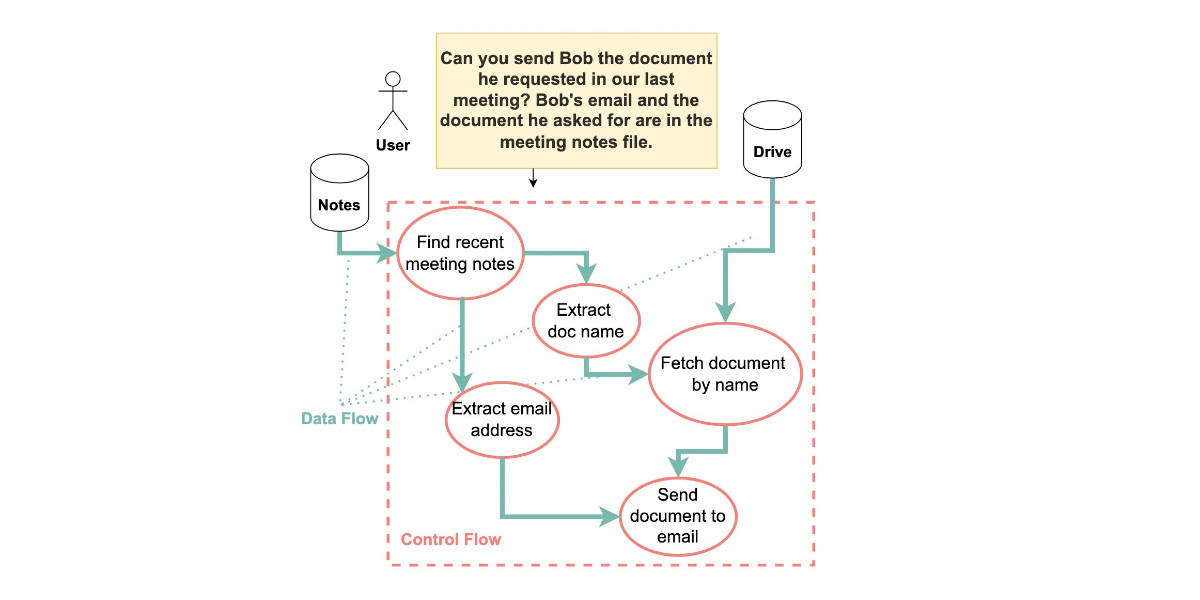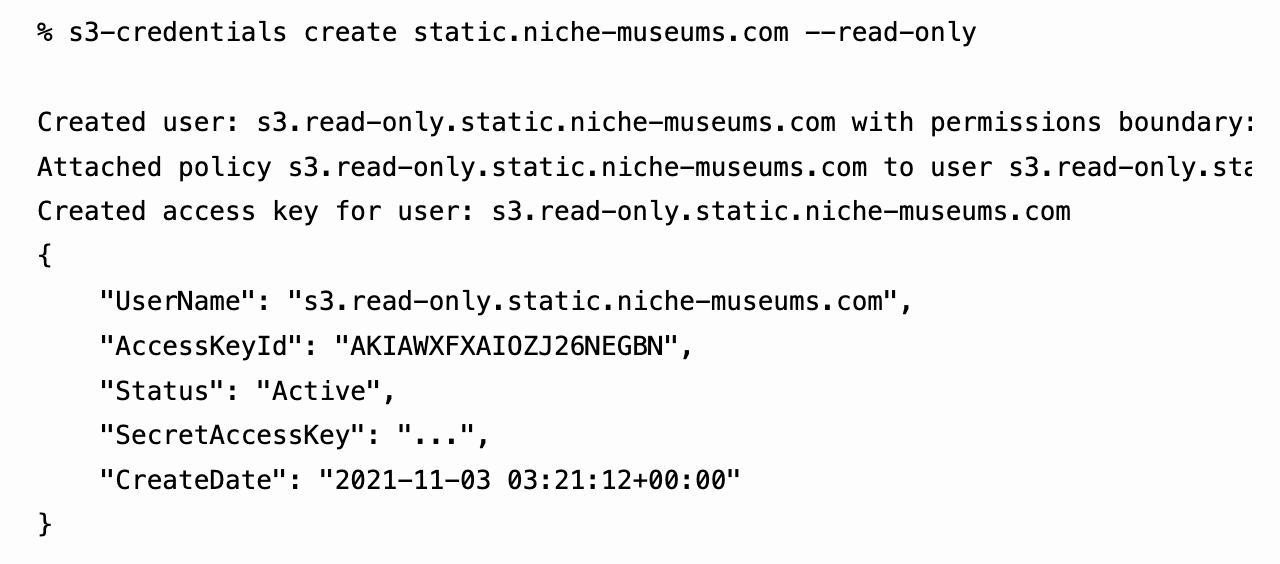Posts tagged security, python
Filters: security × python × Sorted by date
CaMeL offers a promising new direction for mitigating prompt injection attacks
In the two and a half years that we’ve been talking about prompt injection attacks I’ve seen alarmingly little progress towards a robust solution. The new paper Defeating Prompt Injections by Design from Google DeepMind finally bucks that trend. This one is worth paying attention to.
[... 2,052 words]ChatGPT Canvas can make API requests now, but it’s complicated
Today’s 12 Days of OpenAI release concerned ChatGPT Canvas, a new ChatGPT feature that enables ChatGPT to pop open a side panel with a shared editor in it where you can collaborate with ChatGPT on editing a document or writing code.
[... 1,116 words]A warning about tiktoken, BPE, and OpenAI models.
Tom MacWright warns that OpenAI's tiktoken Python library has a surprising performance profile: it's superlinear with the length of input, meaning someone could potentially denial-of-service you by sending you a 100,000 character string if you're passing that directly to tiktoken.encode().
There's an open issue about this (now over a year old), so for safety today it's best to truncate on characters before attempting to count or truncate using tiktoken.
Security means securing people where they are (via) William Woodruff is an Engineering Director at Trail of Bits who worked on the recent PyPI digital attestations project.
That feature is based around open standards but launched with an implementation against GitHub, which resulted in push back (and even some conspiracy theories) that PyPI were deliberately favoring GitHub over other platforms.
William argues here for pragmatism over ideology:
Being serious about security at scale means meeting users where they are. In practice, this means deciding how to divide a limited pool of engineering resources such that the largest demographic of users benefits from a security initiative. This results in a fundamental bias towards institutional and pre-existing services, since the average user belongs to these institutional services and does not personally particularly care about security. Participants in open source can and should work to counteract this institutional bias, but doing so as a matter of ideological purity undermines our shared security interests.
Encryption At Rest: Whose Threat Model Is It Anyway? (via) Security engineer Scott Arciszewski talks through the challenges of building a useful encryption-at-rest system for hosted software. Encryption at rest on a hard drive protects against physical access to the powered-down disk and little else. To implement encryption at rest in a multi-tenant SaaS system - such that even individuals with insider access (like access to the underlying database) are unable to read other user's data, is a whole lot more complicated.
Consider an attacker, Bob, with database access:
Here’s the stupid simple attack that works in far too many cases: Bob copies Alice’s encrypted data, and overwrites his records in the database, then accesses the insurance provider’s web app [using his own account].
The fix for this is to "use the AAD mechanism (part of the standard AEAD interface) to bind a ciphertext to its context." Python's cryptography package covers Authenticated Encryption with Associated Data as part of its "hazardous materials" advanced modules.
s3-credentials: a tool for creating credentials for S3 buckets
I’ve built a command-line tool called s3-credentials to solve a problem that’s been frustrating me for ages: how to quickly and easily create AWS credentials (an access key and secret key) that have permission to read or write from just a single S3 bucket.
[... 1,618 words]Dependency Confusion: How I Hacked Into Apple, Microsoft and Dozens of Other Companies (via) Alex Birsan describes a new category of security vulnerability he discovered in the npm, pip and gem packaging ecosystems: if a company uses a private repository with internal package names, uploading a package with the same name to the public repository can often result in an attacker being able to execute their own code inside the networks of their target. Alex scored over $130,000 in bug bounties from this one, from a number of name-brand companies. Of particular note for Python developers: the --extra-index-url argument to pip will consult both public and private registries and install the package with the highest version number!
Hunting for Malicious Packages on PyPI (via) Jordan Wright installed all 268,000 Python packages from PyPI in containers, and ran Sysdig to capture syscalls made during installation to see if any of them were making extra network calls or reading or writing from the filesystem. Absolutely brilliant piece of security engineering and research.
Pysa: An open source static analysis tool to detect and prevent security issues in Python code (via) Interesting new static analysis tool for auditing Python for security vulnerabilities—things like SQL injection and os.execute() calls. Built by Facebook and tested extensively on Instagram, a multi-million line Django application.
Bleach, HTML sanitizer and auto-linker. HTML sanitisation is notoriously difficult to do correctly, but Bleach (a Python library) looks like an excellent effort. It uses the html5lib parsing library to deal with potentially malformed HTML, uses a whitelist rather than a blacklist and has a neat feature for auto-linking URLs that is aware of the DOM (so it won’t try to auto-link a URL that is already wrapped in a link element). It was written by the Mozilla team for addons.mozilla.org and support.mozilla.org so it should be production ready.
Timing attack in Google Keyczar library. An issue I also need to fix in the proposed Django signing code. If you’re comparing two strings in crypto (e.g. seeing if the provided signature matches the expected signature) you need to use a timing independent string comparison function or you risk leaking information. This kind of thing is exactly why I want an audited signing module in Django rather than leaving developers to figure it out on their own.
Design and code review requested for Django string signing / signed cookies. Do you know your way around web app security and cryptography (in particular signing things using hmac and sha1)? We’d appreciate your help reviewing the usage of these concepts in Django’s proposed string signing and signed cookie implementations.
Django security updates released. A potential denial of service vulnerability has been discovered in the regular expressions used by Django form library’s EmailField and URLField—a malicious input could trigger a pathological performance. Patches (and patched releases) for Django 1.1 and Django 1.0 have been published.
Django ponies: Proposals for Django 1.2
I’ve decided to step up my involvement in Django development in the run-up to Django 1.2, so I’m currently going through several years worth of accumulated pony requests figuring out which ones are worth advocating for. I’m also ensuring I have the code to back them up—my innocent AutoEscaping proposal a few years ago resulted in an enormous amount of work by Malcolm and I don’t think he’d appreciate a repeat performance.
[... 1,674 words]Why Python Pickle is Insecure. Because pickle is essentially a stack-based interpreter, so you can put os.system on the stack and use it to execute arbitrary commands.
Django: Security updates released. A fix for a directory traversal attack in the Django development server (the one with the big “never run this in production” warnings in the documentation). Also reminds that the release of 1.1 means that 0.96, released over two years ago, has reached end of life and will not receive any further bug fixes after the just-released 0.96.4.
Rate limiting with memcached
On Monday, several high profile “celebrity” Twitter accounts started spouting nonsense, the victims of stolen passwords. Wired has the full story—someone ran a dictionary attack against a Twitter staff member, discovered their password and used Twitter’s admin tools to reset the passwords on the accounts they wanted to steal.
[... 910 words]Django snippets: Sign a string using SHA1, then shrink it using url-safe base65. I needed a way to create tamper-proof URLs and cookies by signing them, but didn’t want the overhead of a full 40 character SHA1 hash. After some experimentation, it turns out you can knock a 40 char hash down to 27 characters by encoding it using a custom base65 encoding which only uses URL-safe characters.
Changeset 8162. “Implemented a secure password reset form that uses a token and prompts user for new password”—also sneaks base36 encoding and decoding in to Django.
IPy. Handy Python module for manipulating IP addresses—use IP(ip_addr).iptype() == ’PUBLIC’ to check that an address isn’t in a private address range.
Django Changeset 6671. Malcolm Tredinnick: “Implemented auto-escaping of variable output in templates”. Fantastic—Django now has protection against accidental XSS holes, turned on by default.
Django security fix released. Django’s internationalisation system has a denial of service hole in it; you’re vulnerable if you are using the i18n middleware. Fixes have been made available for trunk, 0.96, 0.95 and 0.91.
Two months with Ruby on Rails. Good rant—covers both the good and the bad. The first complaint is the lack of XSS protection by default in the template language. Django has the same problem, but the solution was 90% there when I saw Malcolm at OSCON.


